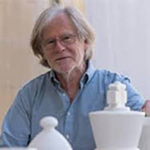Discovery of precision medicines requires the identification of potent and original hits with a robust validation of their mechanisms of action at the molecular level. The discovery of Naa50 binders/inhibitors using DNA-encoded (DEL) illustrates this challenge:
Two novel compounds were identified as Naa50 binders/inhibitors using DNA-encoded (DEL) technology. Biophysical and biochemical data as well as cocrystal structures were obtained for both compounds (3a and 4a) to understand their mechanism of action. These data were also used to rationalize the binding affinity differences observed between the two compounds and a MLGP peptide-containing substrate. Cellular target engagement experiments further confirm the Naa50 binding of 4a and demonstrate its selectivity toward related enzymes (Naa10 and Naa60). Additional analogs of inhibitor 4a were also evaluated to study the binding mode observed in the cocrystal structures.
In this webinar, the Hitgen talk will focus on the application of DNA-encoded library (DEL) technology: the mechanics of DEL, the advantages and challenges of the technology to those considering DEL technology for identifying ligands for their target of interest.
Going one step further, the use of patient-derived xenograft (PDX) enables translation of in vitro results into relevant in vivo predictive pharmacological models to human.
Much progress has been made in understanding the mechanisms of cancer and in the development of innovative therapeutic agents. Despite this, the attrition rates between target discovery and drug marketing approval remains high, especially in oncology. It is hypothesized that one of the main reasons underlying these undesirable statistics is believed to be the lack of predictive power of the model systems used in the preclinical setting. Tumor heterogeneity is a challenge in cancer research and drug development, and it is now demonstrated that patient-derived xenograft (PDX) cancer models should clearly help to better mimic the situation of human cancer pathologies.
The Oncodesign talk will focus on how patient-derived xenograft (PDX) and PDX-derived models should be incorporated into different stages of the drug discovery process, taking the example of Drug Positioning in Breast Cancer with relevant human projection.
Join Oncodesign and HitGen across selected examples, studying the paradigm of novel approaches in the discovery of new drugs in Oncology. It will be a unique opportunity to interactively discuss, debate and answer questions about how oncology drug discovery works today, and how to better apply the concept of personalized medicine to your oncology research within a consortium of experts in their own field from hit finding to pharmacology.
Register for this webinar to gain deeper insight into DRIVE-SM (DRug Integrative discovery for small molecule) premium Integrated Drug Discovery Services.
Speakers

Barry A. Morgan, Chief Scientist Officer, HitGen
Barry A. Morgan has broad experience in drug discovery and development. He is a Professor and Director of Discovery in the Center for Drug Discovery at Baylor College of Medicine, Houston Texas, and has 40 years of experience in drug discovery and development in the Pharmaceutical and Biotechnology industries in the United Kingdom, France and the USA.
He was Vice President, Molecular Discovery, and Site Head at GSK, Boston 2007-2012. He was previously Senior Vice President for Chemistry and Discovery Sciences at PRAECIS Pharmaceuticals Inc., where he was a primary inventor of DNA Encoded Library Technology.
Read more...
Barry has presented at invited seminars at over 50 Academic and Industry Symposia in Europe and the USA, authored over 100 publications, and is an inventor on more than 40 patents in the area of drug discovery. He has contributed to over twenty drug development candidates in a range of therapeutic areas, of which more than ten have been advanced to clinical study. Barry has recruited, managed, and mentored over 100 scientists and 30 interns from the USA, Europe, Asia, Africa, and Australia with B.S. or Ph.D. degrees in chemistry, biology or computational analysis.
Read Less...

Olivier Duchamp, Head of In Vivo Sciences, Oncodesign Service Business Unit at Oncodesign
Olivier Duchamp is the head of the In Vivo Sciences Department at Oncodesign BU Service. He was at the founding of the company and for the last 23 years, contributed largely to its development and innovation in preclinical models and pharmaco-imaging. He holds a Bachelor degree from the University of Lyon (France) and a Master degree in pharmacology and analytical methods from the University of Paris IV (France).
Olivier is also the coordinator of IMODI, (Innovative MODels Initiative), a French consortium dedicated to the development, the characterization and the commercialization of new preclinical models in oncology, including PDX models and humanized mouse models. He is the co-author of several publications about PDX models.
Who Should Attend?
This webinar is intended for scientists and senior management involved in the drug discovery process of novel Oncology and Immuno-Oncology drugs.
What You Will Learn
This webinar will shed the light on DRIVE-SM (DRug Integrative discovery for Small Molecule) offering from hit-finding to preclinical models to assess drug pharmacology in oncology. We will help in enhancing the knowledge of the participants on the recent input of DNA encoding libraries, development of biostructural techniques and translation of pharmacological tools from in vitro to in vivo.
- Introduction to the concept of DRIVE
- Characterization of specific N-α-Acetyltransferase 50 (Naa50) Inhibitors Identified Using a DNA Encoded Library & study cases
- Use of patient-derived xenograft (PDX) cancer models & study case
Xtalks Partners
Oncodesign
Oncodesign is a Biopharmaceutical company which aims at innovation. Its mission is to discover innovative & effective new therapies for the benefit of patients suffering from cancer & serious illnesses with unmet medical needs. Oncodesign Service is an Integrated solutions provider in Drug Discovery. Discover DRIVE-SM, an integrated discovery engine for small molecule – from Hit Finding to IND filing – in oncology, immunology & inflammatory diseases. Access to multiple innovative hit-finding solutions, computational & medicinal chemistry, in vitro biology, ADME / DMPK, in vivo pharmacology & pharmaco-imaging expertise.
HitGen
HitGen is a small molecule Drug Discovery & Development company which has established an industry-leading platform for early-stage drug discovery research centered on DNA encoded chemical libraries (DELs) (design, synthesis & screening). HitGen is the premier provider of DELs & DEL technology, collaborating with multiple pharmaceutical and biotech companies, foundations & research institutes to discover & develop approaches for novel medicines.
You Must Login To Register for this Free Webinar
Already have an account? LOGIN HERE. If you don’t have an account you need to create a free account.
Create Account





